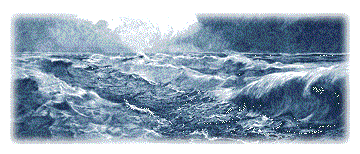In introducing the "Song of the Sea,"
the Bible says, "Then sang Moses and the Israelites." But since the song
is all about the events that had just taken place, it was obviously a brand
new composition. Interpreters therefore wondered exactly how Moses and the
Israelites could spontaneously all sing the same song. Perhaps, somehow,
they just managed to do so:
They sang hymns, O Lord, to your holy name, and praised with one accord
your defending hand. (Wisdom 10:20)
When the Israelites came up from the Red Sea, they sought to praise God,
and the holy spirit came over them and they praised him. (Tosefta Sotah
6:2) |
To some, however, the song itself seemed to imply otherwise. Its
first words were not (in the traditional Hebrew text) "We shall sing," but "I
shall sing." As a matter of fact, the previous verse puts the verb "sing" in
the singular, as if it really meant, "Then Moses sang this song, and along with
him, the other Israelites." Both these points seemed to indicate that Moses
sang first, and that the Israelites somehow joined in:
All the [Israelites] were persuaded by Moses to sing with
hearts in accord the same song... the prophet [Moses]...no longer able to
contain his delight, led off the song, and those w ho heard him joined together
in two choirs to sing with him the story of these same deeds. (Philo, Moses
2:257)
They [the Israelites] passed the whole night in hymns and
rejoicing, and Moses himself composed a song of praise to God in thanks for
His kindness, and it was written in hexameters. (Josephus, Jewish Antiquities
2:346)
"Moses and the Israelites" means that Moses sang the song
on behalf of all the Israelites. (Mekhilta Shirtah 1)
Rabbi Akiba explained: "Then sang Moses and the Israelites this song to
the Lord, and they said, saying..." This [word "saying"] teaches that the
Israelites would repeat each and every thing that Moses said, as those who
recite the Hallel. Rabbi Nechemiah said: "As those who recite the Shema,
and not as those who recite the Hallel." (m. Sotah 5:4)

Moses the prophet sang the song in sections, and when he would finish one
section, he would be silent, and all the elders would answer would answer
with the words, "Sing to the Lord, for He has triumphed gloriously, horse
and his rider has He cast into the sea," and all of Israel would say, "My
strength and my song, and He is become my salvation" until "the Lord is
a hero in war, the Lord is His name." (Tibat Marqa 72b, 104a)
Moses sang and all the people sang back after him. (Ephraem, Commentary
on Exodus 15:1).
Other versions of the text did not present this contradiction between everyone
singing and the words "I shall sing":
Let us sing to the Lord, for He is greatly glorified. (Septuagint,
Targums Exod. 15:1)
Sing [plural] to the Lord. [Samaritan Pentateuch Exod. 15:1]
 |
 From
Prof. James Kugel's new book The Bible as It Was, The Belknap Press
of Harvard Univ. Press, 1997. James Kugel is Starr Professor of Hebrew Literature
at Harvad University and Prof. of Bible at Bar-Ilan University in Israel.
His books include The Idea of Biblical Poetry, Early Biblical Interpretation,
and In Potiphar's House: The Interpretive Life of Biblical Texts. From
Prof. James Kugel's new book The Bible as It Was, The Belknap Press
of Harvard Univ. Press, 1997. James Kugel is Starr Professor of Hebrew Literature
at Harvad University and Prof. of Bible at Bar-Ilan University in Israel.
His books include The Idea of Biblical Poetry, Early Biblical Interpretation,
and In Potiphar's House: The Interpretive Life of Biblical Texts.
|
NISAN Table of Contents
|



